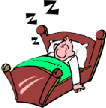good nightís sleep.

The human sleep cycle comprises of several fluctuating stages. The first is a stage between being asleep and awake. Then is the deep sleep stage also called delta sleep when dreaming happens. This is also the stage when cell repair and rejuvenation happens.
This is followed by REM or rapid eye movement sleep when there is considerable eye movement and it is during this stage that the brainís mental faculties are rejuvenated. However, you may even go back and forth between various sleep cycles.
All body functions continue but at a slower pace.
The cerebral cortex of the human brain only switches off during sleep, providing it with the much needed rest for restoration.
 Too little sleep is not good from recouping and restoration point of view of the body. Adequate sleep for most people is a minimum of seven to eight hours.
Too little sleep is not good from recouping and restoration point of view of the body. Adequate sleep for most people is a minimum of seven to eight hours.
 In hibernating animals sleep serves a significant purpose of energy conservation. However in humans it only results in a drop in the metabolic rate by five to ten percent.
In hibernating animals sleep serves a significant purpose of energy conservation. However in humans it only results in a drop in the metabolic rate by five to ten percent.
Some people may even require ten hours of sleep to recoup. If you who are sleep deprived you will tend to risk having a poorer immune system and may become frequently tired, depressed and anxious.
You also become more accident prone, due to lack of concentration, especially while driving or working on machines.
Babies who lack adequate sleep tend to become cranky and do not eat or grow well.
Sleep helps keep the bodyís immune system stay in good shape. It has also been found that those who consistently sleep six hours or less have a higher mortality rate than those who sleep a minimum of seven to eight hours.
If you sleep during the weekdays is inadequate, it is a good idea to make up for the lack of sleep during the weekend.
Excessive sleep however does not help to enhance health. Continuous pattern of excessive sleep results in the deterioration in the quality of sleep and results in not only difficulty in falling asleep, but also lethargy and sluggishness.
When illness, or travel, or work, or stress, results in sleep deprivation, the best solution is a short daytime nap.
Excessive food, alcohol, tobacco and caffeine disturb sleep. Some diseases like cardiac disease, prostrate problems, arthritis, osteoporosis, depression, cancer and pain or sleep apnea can cause sleep disturbances. Medication can improve matters to an extent.
Action movies, disco music and strenuous exercise just before bedtime, are also likely to make it difficult to fall asleep.
A comfortable bed and pillow that supports the body well, loose-fitting nightwear, the optimum temperature as suited to oneself and a well ventilated room and waking up and sleeping at regular timings helps you get a good nightís rest.
Relaxation exercises, soft soothing music or reading a non-violent, non-horror book can induce sleep.
Some people use alcohol to fall asleep. However an excess of alcohol can cause a disturbed and poor quality of sleep. While you may fall asleep more easily the sleep you get will not refresh you well enough due to the disturbed pattern of the sleep.
A hot cup of milk, or a good days work can do wonders for a good nights sleep. If you suffer from chronic insomnia you should consult a doctor as you may need medical treatment for stress, or other sleep related challenges.
keeps your bodyís
immune system in shape.